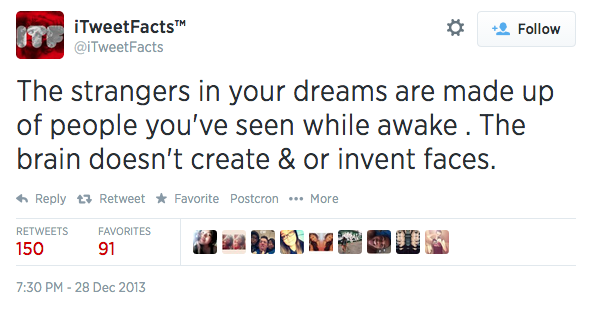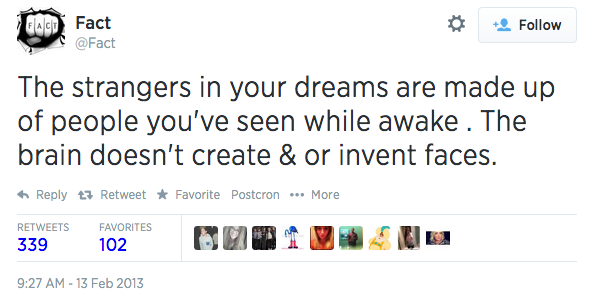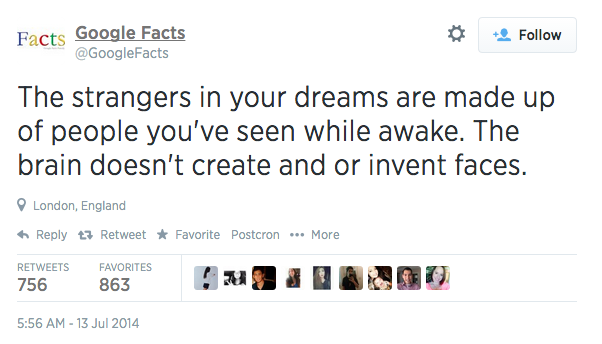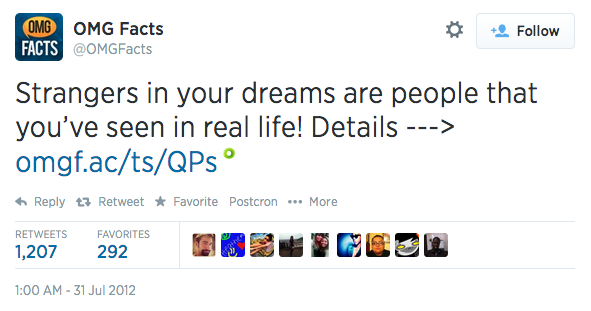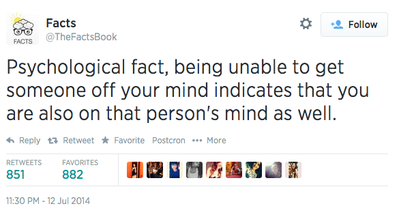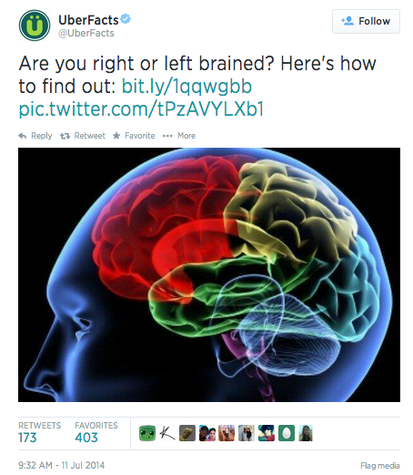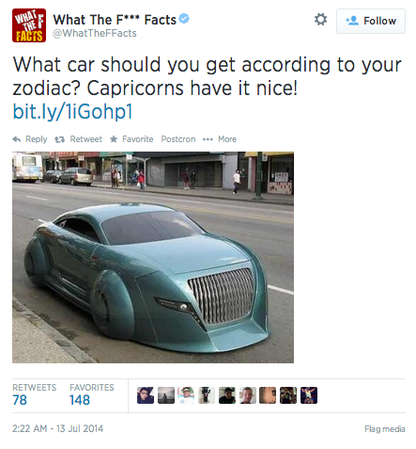by Cherry Teresa
On social networking sites such as Facebook and Twitter, several pages with "Facts" in their names have an impressive number of followers and shares . The fact is, many "facts" sites are filled with hogwash. People who otherwise fact check before spreading nonsense are quick to share these posts. I wonder if having the word "facts" in a name makes some people more trusting of it.
A popular assertion made on these "fact" feeds is that strangers in your dreams are actually people you've seen before in real life. The claim is that our brains can remember people we may have only briefly encountered once in our lives but cannot make up original images of people's faces. This sounds fascinating, but the only references I could find that agreed with this, aside from other "facts" pages, were sites related to psychics and astrology - two "junk science" fields. And they did not cite their sources.
A collection of tweets:
On social networking sites such as Facebook and Twitter, several pages with "Facts" in their names have an impressive number of followers and shares . The fact is, many "facts" sites are filled with hogwash. People who otherwise fact check before spreading nonsense are quick to share these posts. I wonder if having the word "facts" in a name makes some people more trusting of it.
A popular assertion made on these "fact" feeds is that strangers in your dreams are actually people you've seen before in real life. The claim is that our brains can remember people we may have only briefly encountered once in our lives but cannot make up original images of people's faces. This sounds fascinating, but the only references I could find that agreed with this, aside from other "facts" pages, were sites related to psychics and astrology - two "junk science" fields. And they did not cite their sources.
A collection of tweets:
"OMG Facts" was the only post I saw with this claim that actually included a link. But this was it (not exactly scholarship). At the bottom, there's a supposed source, but it links to Listverse - another not very reliable source - and it does not cover all the claims that were stated. The Listverse page does not have any links or citations to their sources.
One source that wasn't one of the many "facts" pages or a pseudoscience site was an article on Psychology Today, which stated the opposite claim. The author has a B.A. in Psychology and a Ph.D. in Behavioral Neuroscience, lending the piece some legitimacy. But let's say that, for the sake of argument, this article or his sources are flawed. I'm still inclined to be skeptical of the claim that strangers in dreams are always people we've seen in real life, as I can't find any data or studies to show this is true.
Here's another:
One source that wasn't one of the many "facts" pages or a pseudoscience site was an article on Psychology Today, which stated the opposite claim. The author has a B.A. in Psychology and a Ph.D. in Behavioral Neuroscience, lending the piece some legitimacy. But let's say that, for the sake of argument, this article or his sources are flawed. I'm still inclined to be skeptical of the claim that strangers in dreams are always people we've seen in real life, as I can't find any data or studies to show this is true.
Here's another:
This one doesn't appear to be completely false. From what I can tell, 10 letters seems to be the maximum for English words. (Please correct me if I'm wrong, as I couldn't find a definitive source for this.) But perpetuity, proprietor, requietory, and repertoire also apply. And, at the risk of sounding too picky here, this doesn't mention if they're talking about all words or just the English language.
No source is given for this and I couldn't find anything confirming the claim. But let's just think about this for a moment. This is hogwash. This doesn't even seem to fall under psychology, but rather telepathic powers or psychic energy, which are pseudoscience.
The bit.ly link redirects you to an online test. Taking it is probably a waste of time considering that being "left-brained" or "right-brained" is a myth.
Astrology is a pseudoscience. Engage some critical thinking again: aren't there others born around the same time as you who have different tastes in cars?
I did several different Google searches to see if this was true and could not find anything. Even if this were true, why isn't there a link or any type of credit to where this "fact" is from?
Why did I take the time to point all this out? After all, it's just the Internet. It's not real life; not everything is to be taken seriously. The problem is that these sites are often assumed to be authoritative. These "factoids" are retweeted and shared over and over again. Some people end up believing in false things based on such sources. I've actually heard these being repeated in everyday life and used to make life decisions.
It's important to think critically and not just accept all claims made by a page with “facts” in its name. Be wary when they don't list a source - granted, Twitter has a 140-character limit making it shorthand in the first place - but the ones that do often link to something that isn't a credible source.
Some of the pages I've mentioned do have some real facts in other posts. This may make it easier to be fooled by the bogus ones, as some trust has been built. But just because a page has used some real information previously doesn’t mean we should fail to find out if each individual post is based on any real evidence before accepting them as fact (and then repeating them). Take the time to find out before hitting “share” or “retweet” so we can do out part to reduce the spread of misinformation.
Why did I take the time to point all this out? After all, it's just the Internet. It's not real life; not everything is to be taken seriously. The problem is that these sites are often assumed to be authoritative. These "factoids" are retweeted and shared over and over again. Some people end up believing in false things based on such sources. I've actually heard these being repeated in everyday life and used to make life decisions.
It's important to think critically and not just accept all claims made by a page with “facts” in its name. Be wary when they don't list a source - granted, Twitter has a 140-character limit making it shorthand in the first place - but the ones that do often link to something that isn't a credible source.
Some of the pages I've mentioned do have some real facts in other posts. This may make it easier to be fooled by the bogus ones, as some trust has been built. But just because a page has used some real information previously doesn’t mean we should fail to find out if each individual post is based on any real evidence before accepting them as fact (and then repeating them). Take the time to find out before hitting “share” or “retweet” so we can do out part to reduce the spread of misinformation.
Cherry Teresa is a blogger and keyboardist who includes skeptical and humanistic themes in her work. You can read her posts and listen to her music at cherryteresa.com

